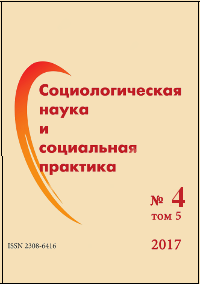Российская молодёжь в формировании и использовании интеллектуального потенциала
Аннотация
Литература
Горбунова О. Н., Гегамян М. А. Образование как актуальный компонент человеческого потенциала // Социально-экономические явления и процессы. 2013. № 12 (58). С. 25—28.
Заславская Т. И. Человеческий потенциал в современном трансформационном процессе (начало) // Общественные науки и современность. 2005. № 3. С. 5-16.
Заславская Т. И. Человеческий потенциал в современном трансформационном процессе (окончание) // Общественные науки и современность. 2005. № 4. С. 13-25.
Зосимова Л. А., Зайцева И. А., Шуртухина И. В. Человеческий потенциал как основа инновационной экономики // Актуальные вопросы образования и науки. 2016. № 1-2 (53-54). С. 103-105.
Иванов О. И. Человеческий потенциал современной российской экономики // Журнал социологии и социальной антропологии. 2012. Т. 15. № 1. С. 140-156.
Индикаторы образования: 2017: статистический сборник / Н. В. Бондаренко, Л. М. Гохберг, И. Ю. Забатурина и др.; Нац. исслед. ун-т «Высшая школа экономики». М.: НИУ ВШЭ, 2017. 320 с.
Константиновский Д. Л., Попова Е. С. Интеллектуальный потенциал, ин¬новации и образование // Социологическая наука и социальная практика. 2016. Т. 4. № 4. С. 36-60.
Костылева С. Ю., Толмачева Е. В. Роль человеческого потенциала науки в повышении эффективности институциональных реформ высшей школы: выводы для экономической политики // Вестник ТГУ. 2015. Выпуск 5 (145). С. 171-177.
Латова Н. В. Средние специальные учебные заведения: журавль в небе или синица в руках? // Общественные науки и современность. 2016. № 1. С. 34-46.
Лебединцева Л. А. Особенности инновационного интеллектуально¬го труда и воспроизводства интеллектуального потенциала: опыт России // Информационное общество. 2012. Вып. 1. С. 30-36.
Народное хозяйство РСФСР в 1988г. Стат. ежегодник. М.: Финансы и статистика, 1989. 688 с.
Натхов Т., Полищук Л. Инженеры или юристы? Институты и спрос на выс¬шее образование // Вопросы экономики. 2012. № 10. С. 30-51.
Новые смыслы в образовательных стратегиях молодёжи: 50 лет исследования [монография] / [Д. Л. Константиновский и др.]. М.: ЦСП и М, 2015. 232 с.
Образование в Российской Федерации: 2014: статистический сборник. М.: Национальный исследовательский университет «Высшая школа экономики», 464 с.
Рабочая сила, занятость и безработица в России 2016: Стат. сб. / Росстат. 2016. 146 с.
Сводные итоги Всероссийской переписи населения 2010 года. [Электронный ресурс] // Росстат. Табл. 2.2. Население по возрастным группам, полу и уровню образования. URL: http://www.gks.ru/free_doc/new_site/perepis2010/croc/ vol11pdf-m.html (дата обращения: 10.08.2017).
Слободчикова И. В., Боджаева В. В. Интеллектуальный потенциал молодёжи как фактор развития экономики региона // Фундаментальные исследования. 2015. № 11-1. С. 199-202.
Соболева И. В. Человеческий потенциал российской экономики. Проблема сохранения и развития. М.: Наука, 2007. 202 с.
Титова Е. В. Условия развития интеллектуального потенциала в процессе инновационной деятельности // Вестник экономической интеграции. 2010. № 12(32). С. 22—28.
Труд и занятость в России. 2005: Стат. сб. / Росстат. M., 2006. 502 с.
Человеческий потенциал для инновационной экономики / [С. А. Иванов и др.]; под. ред. С. А. Иванова; ИПРЭ РАН. СПб.: ГУАП, 2011. 188 с.
Шубкин В. Н. Социологические опыты (Методологические вопросы социальных исследований). М.: Мысль, 1970. 288 с.
Boni A., Gasper D. Rethinking the Quality of Universities: How Can Human Development Thinking Contribute? // Journal of Human Development and Capabilities. 2012. Vol. 13. № 3. August. P. 451—470.
Gylfason T. Natural resources, education, and economic development // European Economic Review. 2001. May. Vol. 45(4—6). P. 847—859.
Konstantinovskiy D. L. Expansion of higher education and consequences for social inequality (the case of Russia) // Higher Education. August 2017. Vol. 74. Is.2. P. 201—220. DOI 10.1007/s10734-016- 0043-7.
Landorf H., Doscher S., Rocco T. Education for sustainable human development: Towards a defi¬nition // School Field. 2008. Vol. 6. № 2. P. 221—236.
Little A. Development studies and comparative education: context, content, comparison and contributors // Comparative Education. 2000. Volume 36. № 3. P. 279—296.
Shulruf B., Morton S., Goodyear-Smith F., O’Loughlin C., Dixon R. Designing Multidisciplinary Longitudinal Studies of Human Development. Analyzing Past Research to Inform Methodology // Evaluation & the Health Professions. September 2007. Vol. 30. № 3. P. 207—228.








 Издатель: Федеральное государственное бюджетное учреждение науки
Издатель: Федеральное государственное бюджетное учреждение науки